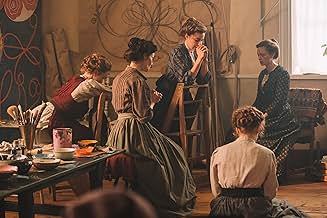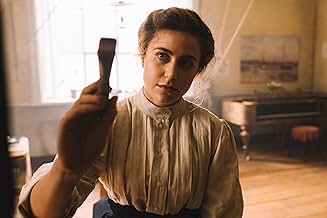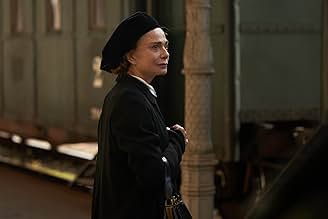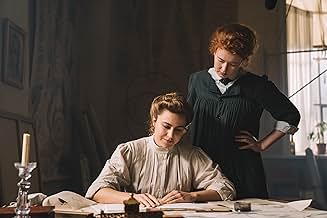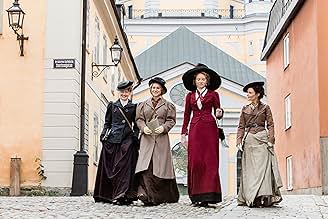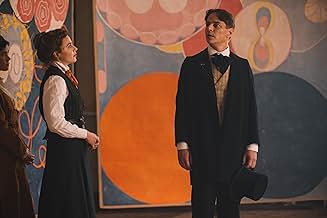Hilma
- 2022
- 2h
IMDb RATING
6.0/10
1.1K
YOUR RATING
Exploring Hilma af Klint's enigmatic life, now recognized as one of the Western world's first abstract artists.Exploring Hilma af Klint's enigmatic life, now recognized as one of the Western world's first abstract artists.Exploring Hilma af Klint's enigmatic life, now recognized as one of the Western world's first abstract artists.
- Awards
- 2 nominations
- Director
- Writer
- All cast & crew
- Production, box office & more at IMDbPro
Storyline
Did you know
- TriviaThe distinguished veteran film critic Michale Darvell in his annual round up of all the film released in UK, online or on television voted "Hilma" as the No2 Best Film of 2022. No1 was "Living".
Featured review
What would I know about Hilma af Klint? Nothing. But one has to wonder how much any of us know about her. She was practically erased from art history for economical reasons for a long time, then brought back as a victory to feminism and artistic expression. She was also a really weird person and reports about her vary considerably to the point of total contradiction. So what would a conscientious movie production do about this? Well, create a very personal account from the viewpoint of Hilma, as if we knew everything about her.
This is also a Swedish film, but spoken in English, with a cast of Swedish, British, German and even Australian actors, with international social and economic interests connected to every bit of the film and ending with a really self-congratulatory visit to the New York Guggenheim. In other words, I may not know a lot about af Klint, but I am pretty sure this film was not about objective truth.
And if that was not enough, almost 20 minutes of the film's start is dedicated to showing how a smart female polymath was dismissed and held back by grobian men and the only love she could find was in a lesbian relationship. I watched this in a cinema and a lot of the couples there were all female. Nothing against that, but add some more agenda to the film, just for fun.
The positive is that most of the cast acted really well and the imagery was really beautiful. There were some era recordings remastered and then actors horribly composited over and the one static tramway car used repeatedly throughout the film, but let's put that on budget and technical constraints. Also, I can't say Tora Hallström played badly, but when the switch from young to old was made and Lena Olin came in to play af Klint, her acting skill overshone everything.
In fact, I would say that I was about to enjoy the film right about the end because of Lena Olin's work alone. Before that I absolutely hated Hilma's character: monomaniacal, egocentric, treating everybody like steps towards her spiritual goals. When Olin came on board I was shocked on how suddenly I was starting to like the character.
Anyway, there is a fine line between madness and genius and I guess it all depends from which side you are writing the script. In Hilma we are presented with a somewhat borderline personality, but the story is told from her perspective. As a result from "the five" that represented her gaggle of spiritual artists we only see her and her romantic partner, which she uses and discards with abandon anyway. Her visions and communications with the "High masters" is portrayed as truth that any elevated person should accept. All other people are seen as close minded, boorish, intellectually, spiritually and emotionally inferior to her. The deaths themselves: her sister, her father, her mother, her partner, her idol as presented in a way that show how self centered she was: traumatized by the loss of her sister, quickly accepting the death of her father, her mother dying off screen, her partner dying somewhere far and she again making a fantasy of communion with the dead and moving on, then again shocked by the death of an idol which she had imagined all her life to be her soulmate, but which in fact was just a dude minding his own business and being obnoxious.
Bottom line: the film was sometimes really beautiful and the cast competent. However the many agendas crammed into it spread it all over the place. Is it a film about art, about spiritism, about feminism, a personal biography or another exposé of a crazed self absorbed larger than life persona or a propaganda piece for the rewriting of art history according to modern sensibilities? All of the above. And unfortunately not a very good film overall.
This is also a Swedish film, but spoken in English, with a cast of Swedish, British, German and even Australian actors, with international social and economic interests connected to every bit of the film and ending with a really self-congratulatory visit to the New York Guggenheim. In other words, I may not know a lot about af Klint, but I am pretty sure this film was not about objective truth.
And if that was not enough, almost 20 minutes of the film's start is dedicated to showing how a smart female polymath was dismissed and held back by grobian men and the only love she could find was in a lesbian relationship. I watched this in a cinema and a lot of the couples there were all female. Nothing against that, but add some more agenda to the film, just for fun.
The positive is that most of the cast acted really well and the imagery was really beautiful. There were some era recordings remastered and then actors horribly composited over and the one static tramway car used repeatedly throughout the film, but let's put that on budget and technical constraints. Also, I can't say Tora Hallström played badly, but when the switch from young to old was made and Lena Olin came in to play af Klint, her acting skill overshone everything.
In fact, I would say that I was about to enjoy the film right about the end because of Lena Olin's work alone. Before that I absolutely hated Hilma's character: monomaniacal, egocentric, treating everybody like steps towards her spiritual goals. When Olin came on board I was shocked on how suddenly I was starting to like the character.
Anyway, there is a fine line between madness and genius and I guess it all depends from which side you are writing the script. In Hilma we are presented with a somewhat borderline personality, but the story is told from her perspective. As a result from "the five" that represented her gaggle of spiritual artists we only see her and her romantic partner, which she uses and discards with abandon anyway. Her visions and communications with the "High masters" is portrayed as truth that any elevated person should accept. All other people are seen as close minded, boorish, intellectually, spiritually and emotionally inferior to her. The deaths themselves: her sister, her father, her mother, her partner, her idol as presented in a way that show how self centered she was: traumatized by the loss of her sister, quickly accepting the death of her father, her mother dying off screen, her partner dying somewhere far and she again making a fantasy of communion with the dead and moving on, then again shocked by the death of an idol which she had imagined all her life to be her soulmate, but which in fact was just a dude minding his own business and being obnoxious.
Bottom line: the film was sometimes really beautiful and the cast competent. However the many agendas crammed into it spread it all over the place. Is it a film about art, about spiritism, about feminism, a personal biography or another exposé of a crazed self absorbed larger than life persona or a propaganda piece for the rewriting of art history according to modern sensibilities? All of the above. And unfortunately not a very good film overall.
- How long is Hilma?Powered by Alexa
Details
Box office
- Gross US & Canada
- $35,935
- Opening weekend US & Canada
- $5,727
- Apr 16, 2023
- Gross worldwide
- $768,256
- Runtime2 hours
- Color
Contribute to this page
Suggest an edit or add missing content



![Trailer [OV]](https://m.media-amazon.com/images/M/MV5BMjg5YWNkZDUtMmI0Zi00OGNiLTkzYmYtZDFlMDU1ZTlhNTliXkEyXkFqcGdeQXRyYW5zY29kZS13b3JrZmxvdw@@._V1_QL75_UX500_CR0)
